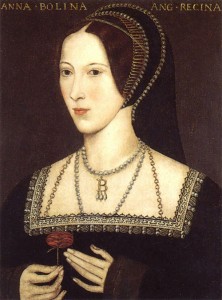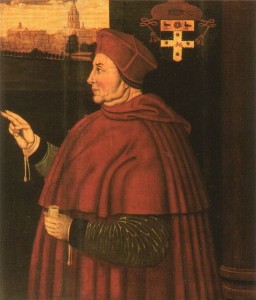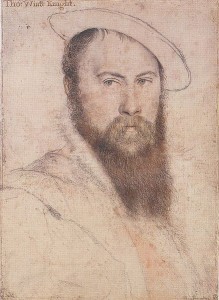 In Part Six, I wrote about how the first recorded sighting of Anne Boleyn at the English Court was on the 1st March 1522, at the Château Vert Shrovetide pageant. Contrary to the scene in “The Tudors”, Henry VIII did not fall in love with Anne at this pageant, he was actually having an affair love with Anne’s sister, Mary Boleyn, at the time and Anne had returned to England to marry James Butler. In 1522 there was no spark between Henry and Anne, no meeting of eyes across a crowded room, and nobody had any idea that the girl who played Perseverance in the pageant would one day be Queen of England. So, what was Anne’s romantic background before Henry VIII?
In Part Six, I wrote about how the first recorded sighting of Anne Boleyn at the English Court was on the 1st March 1522, at the Château Vert Shrovetide pageant. Contrary to the scene in “The Tudors”, Henry VIII did not fall in love with Anne at this pageant, he was actually having an affair love with Anne’s sister, Mary Boleyn, at the time and Anne had returned to England to marry James Butler. In 1522 there was no spark between Henry and Anne, no meeting of eyes across a crowded room, and nobody had any idea that the girl who played Perseverance in the pageant would one day be Queen of England. So, what was Anne’s romantic background before Henry VIII?
The Butler and Chaplain
In the reign of Elizabeth I, Catholic recusant Nicholas Sander wrote of how Anne Boleyn was sent to Brie in France at the age of 15 after she had “sinned first with her father’s butler, and then with his chaplain”1. According to Sander, she was placed in the care of a French nobleman and then, when she later appeared at the French court, she became known as “the English Mare” and “the royal mule” because of “her shameless behaviour” and her loose morals.
It is hard to take this claim seriously when we know that Anne Boleyn was sent to the court of Margaret of Austria in 1513 to finish her education and that she was then appointed, in 1514, as one of Mary Tudor’s ladies when Mary became Queen of France. When Mary returned to England in 1515, after the death of her husband Louis XII, Anne stayed to serve Queen Claude, wife of the new king, Francis I and there is no evidence of Anne having a bad reputation or being promiscuous in France, it was Anne’s sister, Mary, who was nicknamed “The English Mare” and who the French King knew to be “una grandissima ribalda et infame sopre tutte”2, not Anne so perhaps Sander was confusing the two Boleyn girls. Whatever the case, Sander is the only person to mention a liaison between Anne and her father’s chaplain and butler so I believe that it is a case of Sander trying to blacken Anne Boleyn’s name and discredit Elizabeth I.
The Courtier – Henry Percy
In his biography of Cardinal Wolsey, “”The Life of Cardinal Wolsey”3, Wolsey’s gentleman-usher, George Cavendish, tells of the relationship, in around 1523, between Anne Boleyn, who was working as one of Queen Catherine’s maids, and Henry Percy, the son and heir of the Earl of Northumberland, who attended on the Cardinal. According to Cavendish, when the Cardinal spent time at Court, Percy “would then resort for his pastime unto the queen’s chamber, and there would fall in dalliance among the queen’s ladies, being at the last more conversant with Mistress Anne Boleyn than with any other.” It was then “that there grew such a secret love between them that, at length, they were ensured together, intending to marry.”
Cavdenish goes on to tell of how the King found out about the relationship between Percy and Anne and he was “much offended” because of his own “secret affection”. Henry VIII then spoke to Wolsey “and consulted with him to infringe the precontract” between Anne and Percy. Wolsey then returned home and called Percy into his presence, chiding him and saying:-
“I marvel not a little of thy peevish folly, that thou wouldest tangle and ensure thyself with a foolish girl yonder in the court, I mean Anne Boleyn. Dost thou not consider the estate that God hath called thee unto this world? For after the death of thy noble father, thou art most like to inherit and possess one of the most worthiest earldoms of this realm. Therefore it had been most meet, and convenient for thee, to have sued for the consent of thy father in that behalf, and to have also made the king’s highness privy thereto; requiring therein his princely favour…”4
Wolsey then explained to Percy that the King would have found him a much better match “according to your estate and honour” and that, by precontracting himself to Anne Boleyn, Percy had offended both the King and his father with his “wilfulness”. According to Cavendish, Wolsey then informed Percy that he was going to send for his father so that he could “either break this unadvised contract, or else disinherit thee for ever” and that the King had “intended to have preferred Anne Boleyn unto another person.” Percy responded by weeping and apologising for offending the King, but defended Anne’s “right noble parentage” and his right to choose “a convenient wife”. He then asked the Cardinal to “entreat” the King on his behalf because “in this matter I have gone so far, before many so worthy witnesses, that I know not how to avoid myself nor to discharge my conscience.”

The meeting between the Cardinal and Percy ended with Wolsey saying that he would send for Percy’s father and ordering Percy to stay away from Anne. When Percy’s father, the Earl of Northumberland, arrived, he did not mince his words, calling his son “a proud, presumptuous, disdainful, and a very unthrift waster” and “wasteful prodigal”, accusing him of offending the King and threatening to disinherit him. Cavendish then writes of how, “after long debating and consultation”, it was decided that the pre-contract should be dissolved and that Percy should marry one of the Earl of Shrewsbury’s daughters (Mary Talbot). Anne Boleyn’s reaction to this news, according to Cavendish, was to be “greatly offended” and to threaten “that if it lay ever in her power, she would work the cardinal as much displeasure”.
The End of the Affair
Henry Percy did indeed marry Mary Talbot, daughter of George Talbot, 4th Earl of Shrewsbury and he did inherit his father’s title on his death in 1527, but by 1530 Percy and Mary were leading separate lives. According to a letter from Chapuys to Charles V in July 1532 (in the Vienna Archives), Henry Percy had to deny, in front of the council, a pre-contract between himself and Anne Boleyn after his wife, Mary Talbot, had reported that he had told her in a quarrel that he was not really her husband because he had previously been betrothed, or legally contracted, to Anne. Mary Talbot had written of the quarrel and alleged pre-contract in a letter to her father, the Earl of Shrewsbury, asking him to tell the King, but, instead, the Duke of Norfolk was informed of the matter and he told his niece, Anne Boleyn. Anne boldly decided that it was best to confront Henry VIII with the matter and ask him to investigate it. This is when Percy was interrogated and when he denied the pre-contract, something that he repeated in May 1536 when the Archbishop of Canterbury was looking to annul the marriage of Henry VIII and Anne Boleyn5.
When we read George Cavendish’s account of the relationship between Henry Percy and Anne Boleyn, we are left thinking that Henry VIII prevented their union because he was interested in Anne but this is probably not the case. Cardinal Wolsey was trying to sort out a marriage between Anne and James Butler and it was these plans which were being threatened by Percy’s “folly”.
If we are to believe Philippa Gregory’s “The Other Boleyn Girl”, then Anne Boleyn purposely seduced Henry Percy so that she could become the Duchess of Northumberland and the couple consummated their betrothal, making it a legal marriage. There is no evidence that the pre-contract between Anne and Percy was ever consummated and there is certainly no evidence that Anne set out to trap Percy, it looks like the two of them simply fell in love. It is sad that these two young people were prevented from marrying, particularly when we consider Percy’s unhappy marriage to Mary Talbot and Anne’s tragic downfall, but I wonder if Anne would have been happy with a man who did not fight for her. We cannot blame Henry Percy for giving up Anne, he was threatened with disinheritance and he was told in no uncertain terms that he was offending the King, but I wonder if Anne was disappointed in him – couldn’t he have put up more of a fight? Couldn’t he have eloped with her? The man she did go on to marry certainly did fight for her and broke with his beloved Church to be with her, perhaps Henry VIII was more of a man than Percy could ever have been.
The story has a tragic ending. On the 15th May 1536, Henry Percy, 6th Earl of Northumberland, was a member of the jury at the trial of his former love, Anne Boleyn. After giving his verdict of “guilty”, Percy collapsed and had to be helped out of the court, and so missed the trial of Anne’s brother, George Boleyn. Anne Boleyn was executed on the 19th May 1536 and Henry Percy died in 1537, just a year later. Anne’s legacy was her daughter, a girl who would become Queen Elizabeth I of England, but Henry Percy left no legacy. His marriage to Mary Talbot had been unhappy and childless, he had been careless with his money and on his death his estates went to the crown and his title went to his nephew, Thomas Percy, a man who was executed during the reign of Elizabeth I for his part in the Rising of the North. A sad end.
 The Poet – Thomas Wyatt
The Poet – Thomas Wyatt
The famous Tudor poet, Sir Thomas Wyatt the Elder, was also linked to Anne Boleyn in the 1520s. He had grown up at Allington Castle, Kent, not a million miles from Anne Boleyn’s childhood home at Hever, but it is at the English Court that he fell in love with Anne.
Wyatt had married Elizabeth Brooke, the daughter of Lord Cobham, in 1521, but it was not a happy marriage and Wyatt’s grandson, George Wyatt, wrote of how, when Wyatt first saw Anne at court, he was “surprised by the sight thereof”6 and could not help but fall for her hook, line and sinker. Wyatt’s poems are evidence of his infatuation with Anne. His poem “What wourde is that that chaungeth not” has the answer “Anna”, he writes of “That Brunet” in “The Lover Confesseth Him in Love with Phyllis” and in “Whoso list to hunt” he tells of a man hunting a hind (Anne), with little chance of success, and then being forced to withdraw from the hunt because of another hunter (Henry VIII).
As I wrote in my article “Sir Thomas Wyatt the Elder”, it appears that Wyatt’s feelings were unrequited, after all, Wyatt had little to offer Anne because he was already married. The “tabloid” Spanish Chronicle7 tells of how Wyatt visited Anne at Hever one day and how he started kissing her and touching her breast before they were disturbed by a stamping noise from upstairs, the stamping of a jealous and impatient lover whose liaison with Anne had been interrupted by Wyatt’s arrival! A story obviously meant to discredit Anne Boleyn, but its mention of Wyatt suggests that there was a link between Anne and Wyatt before her marriage to Henry VIII, although I believe that the relationship was one-sided.
We also have George Wyatt’s story8. In this story, Thomas Wyatt playfully snatches a jewel from Anne and keeps it as a trophy. Some time later, he is playing bowls with the King and arguing over a shot when the King points to the wood with the finger on which he is wearing Anne’s ring and declares “Wyatt, I tell thee it is mine”. Wyatt, seeing the trophy on the King’s finger, replies “If it may like your majesty to give me leave to measure it, I hope it will be mine”, and then takes Anne’s jewel from around his neck and begins to measure the cast with its ribbon. A furious Henry VIII breaks up the game and goes in search of Anne for an explanation.
Later, in May 1530, the Imperial ambassador, Eustace Chapuys, tells of how Charles Brandon, the Duke of Suffolk and Henry VIII’s great friend and brother-in-law, was banished from court after telling the King a story about Wyatt and Anne Boleyn in an effort to show the King that Anne was an unsuitable wife and consort. Suffolk’s banishment shows what Henry thought of the story and his advice, and Henry went on to marry Anne so there was obviously no evidence of an inappropriate relationship between Anne and Wyatt.
Sir Thomas Wyatt was once more linked to Anne Boleyn at her downfall in May 1536. He was arrested, examined by Thomas Cromwell and imprisoned in the Tower of London, but was eventually released in June 1536 after negotiations between his father and Cromwell. He was imprisoned again in 1541 on a charge of treason but was saved by Henry’s fifth wife, Catherine Howard. He died, a year later, on the 11th October 1542.
Wyatt’s son, Thomas Wyatt the Younger, was executed in 1554 after leading a rebellion, Wyatt’s Revolt, against Mary I. Wyatt the Younger went to his death refusing to implicate the daughter of Anne Boleyn, Elizabeth, in the uprising and protesting her innocence. How fitting that the son of the man who had once loved Anne Boleyn saved her daughter from execution.
So, there we have it, an account of the men linked romantically to Anne Boleyn before her marriage to Henry VIII. Although I have often heard people say that Anne Boleyn’s real love was Henry Percy, and she would have been better off marrying him, I have to disagree. Although Anne would have probably had a much longer life that way, I don’t think that Percy was her perfect match. Anne Boleyn was passionate, ambitious and hot-headed, as was her husband, Henry VIII. Their marriage was a meeting of minds, a sharing of passions and a real love, in my opinion. What do you think?
I’ve missed one man out here – James Butler. You can read about the arranged marriage between Butler and Anne Boleyn in my article “The Early Life of Anne Boleyn Part Five – The Boleyns and Butlers“.
Notes and Sources
- Rise and Growth of the Anglican Schism, Nicholas Sander (1585), p25-26
- The words of the Bishop of Faenza, 10th March 1536, LP x.450
- The Life of Cardinal Wolsey by George Cavendish, p48 – 54
- Ibid., p48
- LP x.864
- “The Life of Queen Anne Boleigne”, George Wyatt, p424, quoted in The Early Loves of Anne Boleyn, Josephine Wilkinson
- “The Chronicle of King Henry VIII of England” (The Spanish Chronicle), p99
- George Wyatt’s story retold in Wilkinson, p83
